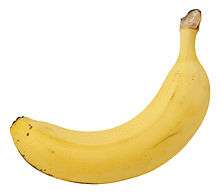Banana wine
Banana wine is a fruit wine made exclusively from bananas.

It is different from banana beer, which has a long tradition and great cultural significance in East Africa. Blocker et al. (2001)[1] wrote a chapter on "Banana Wine" in the book Alcohol and temperance in modern history: an international encyclopedia, though this is slightly confusing, as they define what is traditionally referred to as banana beer as being banana wine. The data they present on Production Techniques and Social Practices and Rituals relates to the latter and not to what is commonly known as banana wine.
In Tanzania, banana wine is made commercially by fermenting peeled, mashed, ripe bananas. Water (to dilute the rather thick banana mash), wine yeast and sugar is added to the "banana mash".[2]
The traditional banana beer processing (as described in the banana beer page and in Blocker et al. (2001)[1]) is different from commercial banana wine processing. For example, the process of making banana wine used by Banana Investment Ltd. is as follows:[3]
- Ripe bananas are peeled and put in plastic barrels filled with water.
- The barrel contents are then pressed (mashed) and banana mash transferred to large metal pots and boiled for several hours, forming a base of juice and pulp.
- The boiled banana mash is strained and sugar added to the left over juice and boiled again.
- The boiled juice is left to cool.
- Wine yeast is added to cooled, sweetened banana juice and placed in plastic fermentation tanks for 15 to 20 days, depending on product.
- The fermented liquid is diluted with sterilized water, bottled and then shipped for distribution.[3]
In commercial production, ‘Cavendish’ bananas are used, while in informal production, a variety of cultivars, including both cooking and beer East African Highland bananas, ‘Pisang awak’, ‘Gros Michel’ and Apple bananas are used.[4] Commercially produced banana wine is a clear, slightly sparkling alcoholic beverage with a longer shelf-life than banana beer, which is spoiled easily and therefore not stored for long periods.[4][5] Depending on the strain of yeast and amount of sugar added, the sweetness and alcohol level in the final product is variable.[2]
Production of banana wine is mostly at a small-scale level, though attempts have been made to bring it up to industrialized production,[6] and there are commercial producers of banana wine (i.e. Arusha-based Banana Investment Ltd).[7]
Since the early 2000s, attempts have been made to expand banana wine production to other countries where the crop is prevalent. The Philippines government has sought to expand a local banana wine industry,[8] while India has produced both award-winning banana wines and research into expanding production.[9][6]
References
- 1 2 Jack S. Blocker; David M. Fahey; Ian R. Tyrrell (2001). Alcohol and Temperance in Modern History. ABC-CLIO. p. 85. ISBN 978-1-57607-833-4.
- 1 2 G. W. Byaruagaba-Bazirake; Pierre van Rensburg; W. Kyamuhangire (2013). Characterisation of banana wine fermented with recombinant wine yeast strains (PDF).
- 1 2 Darren Bounds; Ken Lee; Garrett Wright (August 10, 2012). Banana Investments Entrepreneurial Growth in Tanzania. Columbia Business School / Columbia CaseWorks.
- 1 2 S.R.B. Mgenzi; I.M. Mshaghuley; C. Staver; J.M. Nkuba. (2010). Banana (Musa spp.) Processing Businesses: Support Environment and Role in Poverty Reduction in Rural Tanzania (PDF).
- ↑ "Bananas: food and beverage". Safari Images – Articles and Newsletters. Retrieved March 11, 2014.
- 1 2 "Going bananas over wine". Press Trust of India. September 19, 2010. Archived from the original on January 26, 2011. Retrieved October 23, 2010.
- ↑ "Banana winery at your doorstep". Arusha Times On The Web. Aug 17–23, 2002. Retrieved March 10, 2014.
- ↑ Katrina H. Borromeo (December 2005). "Banana wine, anyone?". Bureau of Agricultural Research Chronicle. Archived from the original on 2014-03-11. Retrieved March 11, 2014.
- ↑ "A new technology for making wine from unpeeled bananas". The Punekar. July 28, 2009. Archived from the original on March 11, 2014. Retrieved October 23, 2010.
External links
- Banana winery at your doorstep – Arusha Times On The Web
- Banana wine anyone? Food biz flashes new ideas in Paris – Food & Drink – Life & Style – The Independent
